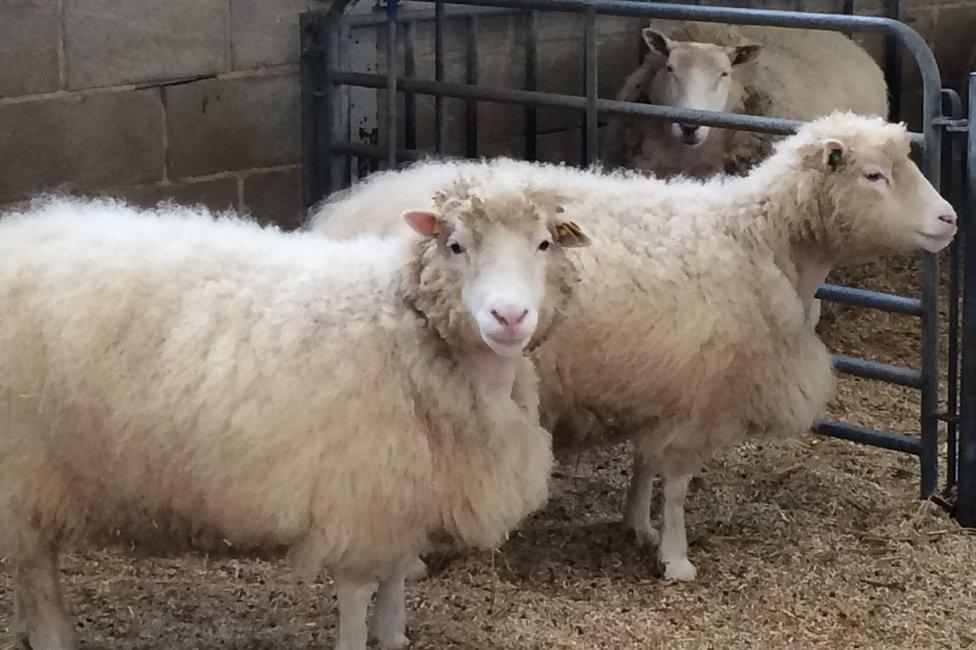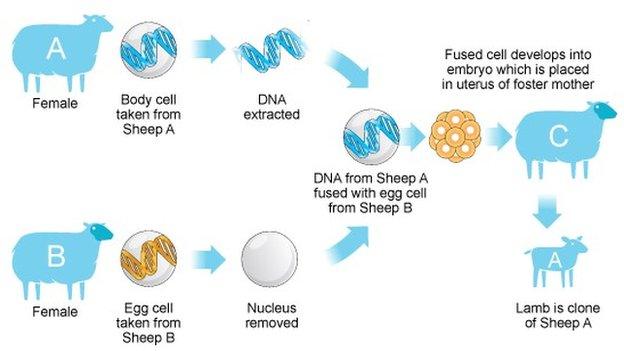Are cloned animals born old?
- Published

Debbie, Denise (foreground) and Diane (background) were cloned from the same ewe as Dolly
Scientists are studying Dolly the sheep's "siblings" in order to study the health of cloned animals - and resolve a puzzle over whether they age normally.
"I'm feeling the joints for any kind of heat or swelling."
Veterinary surgeon Dr Sandra Corr puts Daisy the sheep through a very hands-on physical examination.
"I'm looking for any signs of crepitus or lameness," she says, "Anything that might indicate the onset of disease or osteoarthritis."
But Daisy is not just any sheep. She's a clone. One of a flock of 13 cloned sheep currently living out their lives on a farm owned by the University of Nottingham, and one of only four (the others are Debbie, Denise and Diane) cloned from the same adult ewe as Dolly the sheep - the first cloned mammal born in 1996.
This, despite the passage of a couple of generations in sheep-years, says Kevin Sinclair, professor of developmental biology at Nottingham and lead author on the study, makes them Dolly's - and that original ewe's - identical twin sisters.
"Where there was one Dolly, with these four girls, now there are five," he says.
Stoical sheep
We're standing in a straw-lined pen in a barn on the university's Sutton Bonington Campus and one-by-one all 13 sheep are put through the same set of exacting, methodical tests.
As far as I can tell it's a process the sheep seem well used to. If not exactly enthusiastic, they stoically endure the joint manipulations with something approaching world weary resignation.

Sir Ian Wilmut led the efforts that produced Dolly in 1996
But if the sheep seem unfazed by all the attention, that may be because they are among the most closely monitored and studied animals anywhere in the world.
According to Prof Sinclair, the fate of the whole science of cloning may hang on the results.
He tells me: "One of the big questions that surrounded the creation of Dolly, and all the cloning work that has gone on since, is: do these animals age in a normal way and how healthy are they?"
Age-memory
Underpinning this question is a fundamental concern about the cloning process. Because it involves extracting DNA from the cell of an adult animal - a cell that is fully differentiated and has been through multiple cell divisions - some "age-memory" might be transferred into the next generation.
"That would mean that the cloned animal was somehow much older that you might expect," says Prof Sinclair.
"A new born clone might look like a lamb, but in terms of cellular senescence it would be much older, and the animal would start to develop diseases associated with aging at a much younger age."
Witness: Dolly the Sheep
The original Dolly died at the relatively modest age for a sheep of six-and-a-half. Along with several other members of her flock she had contracted a virus that caused lesions to develop in her lungs and she had to be put down.
But by then Dolly was already suffering from osteoarthritis which, although not unheard of in a sheep of her age, did raise concerns about premature aging. The decision was taken to go back to the original cell line and to produce more clones.
Bad luck?
"We wanted to know if Dolly's untimely death was just unlucky", recalled Prof Sinclair, "or if it was something to do with the cloning process itself. If illnesses like arthritis that are associated with old age were more common in cloned animals."
Getting the answers to those questions has involved putting the dollies, and nine other sheep cloned from different cell lines, through an exhaustive battery of tests and assessments including regular joint X-rays and a series of full-body fMRI scans.

Prof Sinclair said: "We focused on three co-morbidities: cardiovascular disease, diabetes and osteoarthritis - the three co-morbidities most associated with aging. Were these animals any different from the wider population of sheep with regard to these particular co-morbidities."
The results of the study, which could have profound implications for the future of cloning, will be published next week. But for now, the dollies, which are approaching their ninth and tenth birthdays, seem to be in rude health.
Follow Tom on Twitter., external